Evolution: A Developmental ApproachISBN: 978-1-4051-8658-2
Paperback
418 pages
January 2011, Wiley-Blackwell
 This is a Print-on-Demand title. It will be printed specifically to fill your order. Please allow an additional 10-15 days delivery time. The book is not returnable.
Other Available Formats: Hardcover
|
||||||
Connect with Wiley Publicity
What separates humans from Chimpanzees? Is it the genetics of our population, or our different structures and behavior capabilities? To Professor Wallace Arthur it is all of these points, which is why his latest book Evolution: A Developmental Approach sits between the traditional population approach to evolutionary theory and the molecular approach to provide a complete view on the evolutionary development of our world.
“There are many evolution texts ‘out there’, but there are none that cover the ground in the same way as this one,” said Arthur. “This book adopts a very specific approach to the evolution of animals and plants – an approach in which the central theme is how evolution works by altering the course of egg-to-adult development”
Evolution: A Developmental Approach tackles key themes such as developmental repatterning, adaptation and coadaptation, the origins of evolutionary novelties, and evolutionary changes in the complexity of organisms.
Together these themes explain how evolution works by changing the course of embryonic and post-embryonic development, proving a title influenced by the new approach of evolutionary developmental biology, ‘evo-devo’.
A key difference between Evolution: A Developmental Approach and other evolution textbooks is the inclusion of basic population-based evolutionary concepts, as well as comparative developmental genetics and other elements.
Organised on conceptual lines, with the themed chapters and case study examples, the book enables students to see the common themes underlying the evolution of different developmental pathways.
“This is a book about how evo-devo can be integrated with other approaches to evolutionary biology, concluded Arthur, “giving us a more complete view of evolution then has ever been available before”



